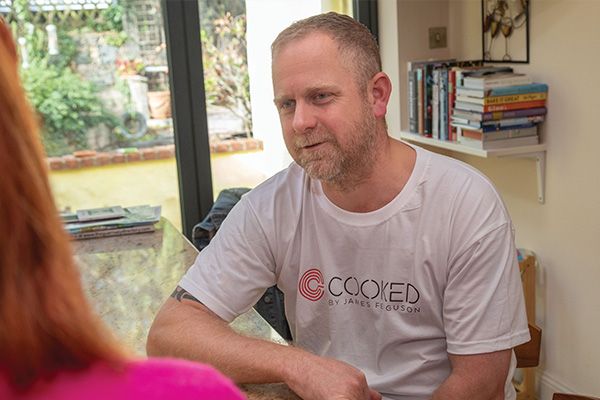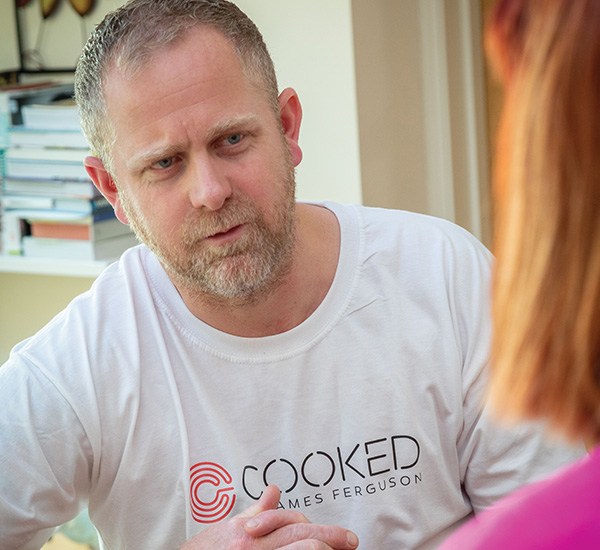

The island isn’t short of choice when it comes to places to eat, but in an island where a successful finance sector offers entrants much higher salary opportunities, encouraging young people into the hospitality sector continues to be a real challenge, according to businessman James Ferguson.
The owner of outside catering company Cooked, said this is an issue for local hotels and restaurants and whilst bringing staff in from outside the island on a seasonal basis might form part of the solution, it doesn’t create continuity or consistency. He spoke to Trish Grover about what’s cooking in the catering business, for Connect magazine.

Pictured: James Ferguson.
James Ferguson always wanted to do something creative and when it came to career choices he considered both cooking and journalism. He undertook work placements with a local magazine publisher and then at the Frégate and the Duke of Richmond Hotel. He enjoyed the buzz of the kitchen and the restaurant, and the compliments paid by satisfied customers at the end of his shift and so his direction was set.
“Catering it was. So I went to Guernsey College of Further Education and did an apprenticeship at the Hotel de Havelet in what’s now Copenhagen Restaurant. I was there for three years and got my formal qualifications.”
He then spent time working at Les Cotils before getting itchy feet, and so he spent a couple of ski seasons in Austria and France, working both as a private chef and in restaurants.
“I would recommend doing the ski season to anyone - as much for the fun as for any career progression. But it was great life experience.”
A life-changing experience in fact, since James met his wife during one of these seasons who now helps him run the business (as well as having a full time job herself). The pair spent some time travelling and eventually came back to Guernsey when James opened the Olive Tree, based at Les Cotils where he also branched into outside catering. He was also teaching part-time at the Guernsey College of Further Education, something he admits that he loved. So when he eventually was approached by Sueco and took on the role as sous chef, he also set up the Sueco Cookery School, offering a range of adult courses to beginners and reasonably proficient amateurs alike.
He completed a teaching qualification whilst running the school, often being assessed while running classes and the qualification is something he is pleased to have under his belt.
“I really enjoyed it and I probably would still be doing some teaching if there were enough hours in the day, but there just isn’t right now.”
James’s experience has incorporated the whole gambit, from private dining, restaurant and hotel work and outside catering.
“Restaurant and hotel work is extremely different from outside catering, with a different set of challenges when you are cooking for 150 in the middle of a field. If you need an extra piece of salmon in the kitchen, it’s in the fridge. If you’re in a field kitchen, it’s a good half an hour turnaround. So careful logistical planning is key.”
James eventually took the plunge to set up Cooked when he was approached by the manager of Rosaire Court – a sheltered housing facility – offering him the use of the facility’s kitchen. James is responsible for the on-site catering for residents, and in exchange, he can use the kitchens to service all his other clients.
“It’s great, even if at times it’s difficult to switch between high-end canapé events, to more standard catering. But it has given me a kitchen base to work from, and I can grow from there I guess. It’s got everything I need. Though a bigger kitchen would make life easier at times.”

Pictured: James Ferguson.
A life in catering means anti-social hours, whatever role you are in. During the summer, James is more focused on private events; in the winter his work is predominantly providing corporate lunches. During the weeks when the two markets overlap, the days are particularly long.
“During September, I worked from about five or six in the morning until about seven in the evening, by the time I have caught up with all the paperwork, and that was pretty much seven days a week. Now the private work will drop off a little so it’s mainly the corporate lunches in company offices. The kitchen is in St Peter Port and it is an ideal base to work from.”
And whilst the days of long business restaurant lunches are arguably largely over, there is still a clear market for ‘in-house’ lunches. In a good week Cooked will supply up to 40 to 50 buffet lunches to a wide variety of businesses, sometimes just for a few, and other times for 30 or so people.
James is quite clearly passionate about his trade and gets a real kick out of creating new menus, particularly for canapés.
“I love it, I have so many books. There is so much you can do – theming, whether that’s ‘mini Moroccan’ or ‘mini Thai’ - even the plates and how they are presented is great. So next year we are going to be doing more of that type of catering. We are going to redesign our menus, creating say a vegan menu a gluten free and lots of others. I tailor menus to suit future trends. So Cuba is a big thing at the moment for example.”
When travelling, James will have looked up a restaurant or two he wants to try as part of his research to try new things without losing sight of his most popular creations.
“Not everything will work in Guernsey and some traditional things will always be on the menu. I have come to accept that there is no better food to complement Champagne, than smoked salmon. It just works.”
Now with two other staff in the kitchen plus a part time driver, the business is really taking off. James took on a school leaver with no experience whatsoever, who has come on leaps and bounds and appears to have found his niche.
“He is now a proper little chef and can take on jobs without having to be supervised all the time. I would like him to take some formal qualifications at some point in the future, but he is doing really well already.”
Service quality is also at the heart of what James is trying to achieve, and he would rather turn down a potential booking if he thinks he might be stretching his resources too thinly and compromising on service.
“It’s important to me to give clients my full attention at a wedding for example. Corporate lunches too can suffer if you take too many on. Even my regular clients would prefer me to be honest and decline the business than to under deliver.”
Salary differentials between catering, and other sectors locally, is clearly a challenge.
“When you are competing with the finance sector you aren’t going to attract people into catering easily. TV shows such as Masterchef makes catering look amazing but that’s not generally the reality of catering. The wages aren’t great, the hours are rubbish so when faced with a choice between that and an office job that will pay considerably more, you can see the issue. Also a lot of chefs locally have left catering to go into an office role. It’s a difficult job to be in.
“People sometimes start and then find it’s perhaps not what they thought, or not what they have seen on the TV.
“I do take on as many work experience students as I can. If they are at school and have an interest in catering then it’s worth trying to nurture it. If they then want a job and I can’t accommodate them I try to put them in touch with other people they could work with. Different people have different skills and there are lots of roles in the kitchen and lots of chefs. So I try to get a feel of the individual students and then match them up with the right kitchen. Some kitchens are a more high pressure environment than others and that doesn’t suit everyone.”
Is there anything the industry could be doing to attract more people?
“You could simply increase wages but then costs would go up and customers won’t like that. To be honest anywhere else the wages aren’t that bad so we get seasonal staff but that in turn means the restaurants don’t have the stability and guaranteed consistent food quality because the turnover of staff is high.
“When the chef is part of the business, and is constantly in the kitchen, then you know that the quality is there.”
Whilst recruitment into the sector is an on-going issue, James has not lost his enthusiasm and one of the key benefits he sees in running his own business is having the creative freedom to try new cuisines and new ingredients.
“That’s the great thing about being my own boss. Last year I was catering for a wedding and the couple had lived in Belize, so they wanted that reflected in the menu. Even though it might cost a bit extra, you can just go online and get any ingredients you need to do these things. It’s really good fun.
“I am still enjoying the buzz of the business and even though I sometimes get stressed out with it all – which I am sure is the same for anyone running a business in whatever industry – I am not ready to give any of that up yet.”
This feature originally appeared in Connect magazine, which you can read in full here.
Comments
Comments on this story express the views of the commentator only, not Bailiwick Publishing. We are unable to guarantee the accuracy of any of those comments.